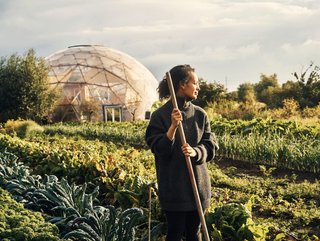COP28: The biggest sustainable food and farming commitments

It’s no secret that food plays a big part in the climate crisis.
Globally, food and farming contribute around a third of global greenhouse gas emissions, according to the UN’s Food and Agriculture.
And with the world’s population expected to reach 10 billion by 2050, issues around food security and environmental impact are only likely to escalate.
“The way we produce and eat food causes 30% of the world’s greenhouse gas emissions, uses over 70% of the world’s freshwater, and is responsible for 80% of the deforestation and habitat loss in tropical areas,” Mariam Almheiri, Minister of Climate Change and Environment of the UAE, said during the opening days of COP28.
“If we don’t quickly find new, sustainable ways to produce and consume food, these problems will worsen in only a couple of decades.”
Put simply, to eliminate hunger and feed the world in a sustainable way, producers need to grow more food without driving the planet past the 1.5-degree limit for global warming.
While there is no single solution – the funding and scaling of sustainable farming methods is widely seen as a crucial way to accelerate the transition to net-zero, nature-positive transitions in food systems, while also ensuring the livelihoods of those farmers and communities most vulnerable to climate change.
“Countries must put food systems and agriculture at the heart of their climate ambitions, addressing both global emissions and protecting the lives and livelihoods of farmers living on the front line of climate change,” said Almheiri.
Negotiations at COP28 have risen to the challenge, with governments, private businesses and non-profits all delivering an array of commitments, investments and launches aimed at transitioning farming and food production to a more sustainable future.
FMC for Food: to accelerate sustainable farming practices
Among significant announcements on food, the World Economic Forum launched the First Movers Coalition for Food.
Supported by the UAE Government and more than 20 food-sector corporate and research partners, including global consultancy Bain & Company, this coalition aims to help increase market demand for agricultural products that are sustainable and low-emission.
The initiative will use combined procurement power to accelerate the adoption of sustainable farming practices and innovation in the food sector – with an estimated value of US$10 billion to US$20 billion by 2030 – enabling a shift toward eco-friendly production.
According to Manny Maceda, CEO of consulting giant Bain, this will “decrease the risks associated with required investments in low-emissions agri-food production, making it easier to expand to net-zero and nature-positive technologies, and help farmers adopt greener practices such as regenerative agriculture”.
Among participating companies, which represent a combined revenue of US$2.1 trillion, are some of the world’s leading food and agricultural multinationals including Bayer, Cargill, Danone, PepsiCo., Louis Dreyfus Company, Nestle and Tyson Foods, along with big regional players such as Majid Al Futtaim and Olam Agri.

Action Agenda on Regenerative Landscapes: to advance practices
Danone, PepsiCo, Cargill and Nestle were also among the big businesses that agreed to significantly scale regenerative agriculture practices on more than 160 million hectares by 2030.
Part of the COP28 Action Agenda on Regenerative Landscapes, investments to date have reached US$2 billion with a further US$2.2 billion committed – and businesses have agreed to report and monitor the impact of their regenerative projects, from greenhouse gas emissions to farmer livelihoods.
Dairy Methane Action Alliance: to cut methane from dairy
Danone and Nestle popped up again at COP28 as part of a group of the world’s six largest dairy companies (others include BEL Group, General Mills, The Kraft Heinz Company, Lactalis USA) who have come to together with the Environmental Defense Fund to help dairy farmers reduce methane emissions and make farming more sustainable.
Called the Dairy Methane Action Alliance, the dairy giants have all agreed to disclose the methane emissions associated with dairy supply chains.
Methane is a big deal. In fact, methane pollution from all sources in 2023 will cause more warming in the decade ahead than all the carbon dioxide from fossil fuels burned this year. That’s why cutting methane emissions is the fastest way to fight climate change.
Tackling livestock methane is a priority in curbing global warming, given it is nearly 30 times more potent than carbon dioxide, according to the US Environmental Protection Agency. Methane pollution from all sources in 2023 will cause more warming in the decade ahead than all the carbon dioxide from fossil fuels burned this year.
Danone has pledged to cut methane emissions from its fresh milk supply chain by 30% by 2030.
COP28 UAE Declaration on Sustainable Agriculture: to scale resilience
During the opening days of the climate conference, a new declaration endorsed by 134 world leaders representing more than 5.7 billion people and nearly 500 million farmers pledged to scale adaptation and resilience efforts for farmers.
With the COP28 UAE Declaration on Sustainable Agriculture, Resilient Food Systems, and Climate Action, leaders have mobilised more than US$2.5 billion to accelerate innovation and finance agriculture-based climate solutions.
This new funding is expected to boost the many initiatives that are already happening in countries across Africa and Southeast Asia, especially, where small family farms are critical for food and jobs – considerably reducing their vulnerability when it comes to food.
Already underway in some countries, farmers are growing new varieties of crops that are more resilient to stress caused by climate change or using warning systems to avoid losses from crop disease – and this funding is expected to help scale up such techniques.
Notably absent from signing the declaration, India said its priorities are food security.
Bill Gates and Jeff Bezos: to invest in food security, sustainability
A prominent voice at COP28, philanthropist and investor Bill Gates called on global leaders to elevate agriculture as a focus of global climate finance initiatives and support the global agriculture research network, CGIAR.
And he put his money where his mouth is, announcing via the Bill & Melinda Gates Foundation a partnership with the UAE Government to commit to a fund totalling US$200 million to go toward agriculture-related research.
The fund is designed to accelerate the development of innovations to help smallholder farmers in sub-Saharan Africa and South Asia build resilience and adapt to climate change.
Amazon founder Jeff Bezoz’s climate foundation the Bezoz Earth Fund donated US$57 million in food-related grants to address deforestation and promote climate-smart agriculture.






